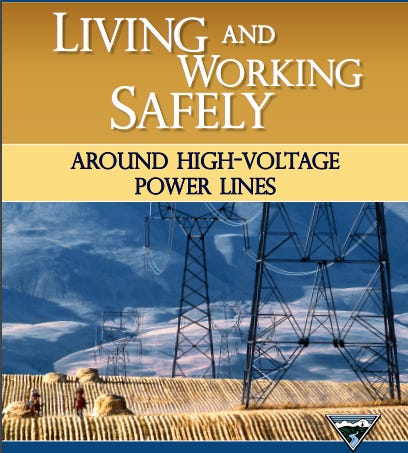Hot-Skin voltage during RV storage
Yes, you can get a shock from your RV even when it's not plugged into shore power!
Mike
We stored our Itasca 30' Class C under high-voltage power lines for a few years. Over the course of time several electrical devices in the unit stopped working or were mostly worthless. I used a Proximity tester and found there was voltage all over the outside of the unit. And after lots of testing of the unit where I found I did not have a hot skin when on the road, I found the same situation existed in other units in the same lot at home. Finally,I don't remember any tingles, but it has been several years since we last parked there and something triggered all the testing. So it must have been a voltage transfer by proximity, I guess. I eventually grounded the chassis when the unit was in storage, and that seemed to help. / Ted DeGroot
Dear Ted,
Oh yes, it’s certainly possible to feel a shock from your RV when it’s not plugged into shore power. And yes, as you guessed it has to do with the overhead power lines coupling magnetically into the metal of your RV chassis and body. I wrote about this effect back in 2017. Read on…
Can overhead power lines create a hot-skin voltage on an RV?
Dear Mike,
I’ve been reading about hot-skin voltages on your No-Shock-Zone site for a while and have come up with a really strange one. We unplugged from a campground and drove several hundred miles before pulling into a storage facility. But when I got out and knelt on the wet ground to check my tire pressure and touched the trailer I got a pretty good shock, even though I’m not plugged into any power. Is it possible there was something wrong with the power outlet back at the campground that charged up my RV? What could possibly be causing this? —Harold
Dear Harold,
Taking a look at the picture of your storage facility gave me the answer to your conundrum. Overhead you’ll see a bunch of high-voltage power lines that are energized with upwards of 250,000 volts. And even though you’re not directly connected to them, the sheer size of your RV allows its chassis and skin to be magnetically coupled to the power lines, thereby creating up to a few thousand volts of hot-skin charge to develop.
But don’t worry, unless you get really close to the power lines (several feet away or less) there will be such little current created that there’s no danger of electrocution.
So the answer is that no, there’s nothing that could have happened back at the original campground that would charge up your RV. Unbeknownst to everyone, every time you drive under a high-voltage power line your RV or other vehicle is indeed charged up to several thousand volts, albeit with a very low current that you’ll only feel if you’re standing on the damp ground and touching your RV.
Note that if your RV was plugged into a properly grounded power outlet, that would have drained away this harmless shock voltage.
And a similar question:
Dear Mike,
We have recently purchased a new travel trailer, and I have noticed a small shock on different occasions while touching the frame. I understand the hot skin condition and what causes it, but what is different in this case is the fact that the trailer is in storage when I've been shocked. No shore power, no generator, and even the battery has been disconnected (using the built-in disconnect switch).
My suspicion is that voltage is being induced by some overhead high-voltage power lines that are directly over the storage facility. On a humid day, you can "hear" the power lines "crackling." I've searched around and haven't found any similar situations described.
Have you ever heard of anything like this? I'm planning to attach a ground wire to a ground post and attach it to the RV frame while it's parked to try and dissipate any voltage. Thanks in advance. —Dave
Dear Dave,
Anytime a large metallic object like an RV is underneath high-voltage power lines there’s a significant voltage induced on its chassis and body which can range from a few hundred to several thousand volts. That’s due to magnetic/capacitive coupling, and it’s a very well-defined problem out West where there’s 500,000-volt to 1,000,000-volt power lines running over top of roadways and parking lots.
Now, there’s very little fault current at your RV available from this coupling, perhaps 1mA, so it’s not dangerous at all. But the induced potential can be upwards of 10,000 volts. And even this small amount of fault current is sufficient to startle you from a shock, which could cause you to fall off a ladder or roof.
This is such a big issue on farms out West that one of the large power company briefs suggests that you add a ground rod to metallic objects under power lines such as metal sheds, fences and irrigation pipes. So I think that adding a ground rod in your case is a good idea. Make sure there’s not underground wiring or pipes where you plan to drive a ground rod (call your local utility first) and use a standard 8-foot rod you can purchase from Lowe's or Home Depot.
Read this very interesting article on living safely around high-voltage power lines from the Bonneville Power Association. You can download it HERE
Let’s play safe out there…. Mike
Please Share this article with all your RVing friends by clicking the button below.






